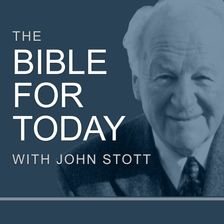Marks of a Healthy Church - Part 1
May 9, 2021

The Bible for Today with John StottPremier
John Stott explains that while it is good to expect revival in the church, there are certain things that are necessary for this to happen. He shows that the church must firstly be healthy, and what constitutes a healthy church.
More From The Bible for Today with John Stott

Marks of a Healthy Church - Part 2
The Bible for Today with John Stott
May 16, 2021
John Stott shows how it is sometimes possible to avoid 'speaking truth to power' if it means receiving less opposition. He explains that there must be

Jesus Christ: Tried, Tested And Proven - Part 1
The Bible for Today with John Stott
May 23, 2021
John Stott investigates how the church went from being a handful of people that Jesus gathered around Him to the world-wide phenomenum it is today.

Jesus Christ: Tried, Tested And Proven - Part 2
The Bible for Today with John Stott
May 30, 2021
John Stott shows that although we have never seen Jesus, there were many who did when He was on earth. Some of those people wrote down eye-witness acc

The Spirit and the Bible - Part 2
The Bible for Today with John Stott
May 2, 2021
John Stott shows how that being faithful to the Bible can often result in the church facing opposition, and why we need to be steadfast in our belief

The Spirit and the Bible - Part 1
The Bible for Today with John Stott
April 25, 2021
John Stott explains how the Bible came into existance and how God spoke to individual writers through the inspiration of the Holy Spirit. John Stott s

Encounter With Jesus - Part 2
The Bible for Today with John Stott
April 18, 2021
John Stott shows us that there is a world of difference between knowing about Jesus and knowing Jesus personally, and how this can only happen by us o
More on OpenTheo

Sense, Sensibility, and Adam Smith with Jan Van Vliet
Life and Books and Everything
February 16, 2026
This year is a special anniversary for the United States as Americans celebrate 250 years of independence. But 1776 was an important year in more ways

Can You Recommend Good Books with More In-Depth Information and Ideas?
#STRask
January 22, 2026
Questions about good books on Christian apologetics, philosophy, and theology with more in-depth information and ideas, and resources to help an intel

Did Jesus Prove He Wasn’t Sinless When He Overturned the Tables?
#STRask
December 29, 2025
Questions about whether Jesus proved he wasn’t sinless when he overturned the tables, whether Jesus’ response to the Pharisees in Mark 3:22–26 was a b

What About Those Who Never Heard the Name of Jesus?
#STRask
December 22, 2025
Questions about what will happen to those who never heard of Jesus or were brought up in a different faith, whether there’s biblical warrant to think

Conservatism and Religious Freedom with John Wilsey
Life and Books and Everything
October 27, 2025
What is conservatism? And why does it go hand in hand with religious freedom? How should we think about the American experiment of ordered liberty? Ha

How Should I Respond to an LGBTQ Person Who Says He Feels Good About Who He Is?
#STRask
March 2, 2026
Questions about responding to an LGBTQ person who says he feels good about who he is, and whether—since we all have sin in our life we don’t consider

Can You Provide Verifiable, Non-Religious Evidence That a Supernatural Jesus Existed?
#STRask
November 10, 2025
Question about providing verifiable, non-religious evidence that a supernatural Jesus existed.
* I am an atheist and militantly anti-god-belief. Ho

Kingdom Priorities: Following the Teachings of Jesus
Knight & Rose Show
February 14, 2026
Wintery Knight and Desert Rose discuss Jesus' teachings from the Gospels, emphasizing truth, evidence, self-denial, and forgiveness. They explore pass

Are You Accursed If You Tithe?
#STRask
December 15, 2025
Questions about whether anyone who tithes is not a Christian and is accursed since Paul says that if you obey one part of the Mosaic Law you’re obliga

Why Would Any Rational Person Have to Use Any Religious Book?
#STRask
December 8, 2025
Questions about why any rational person would have to use any religious book, whether apologetics would be redundant if there were actually a good, un

How Do We Advocate for Christian Policy Without Making the Government Interfere in Every Area of Life?
#STRask
November 20, 2025
Questions about how to advocate for Christian policy without making the government interfere in every area of life, and the differences between the mo

Christmas Cranks and Christmas Blessings with Justin Taylor and Collin Hansen
Life and Books and Everything
December 17, 2025
If you are looking for a podcast where three friends talk about whatever they want to talk about and ramble on about sports, books, and grievances, th

How Would You Convince Someone That Evil Exists?
#STRask
November 17, 2025
Questions about how to convince someone that evil exists, whether Charlie Kirk’s murder was part of God’s plan, whether that would mean the murderer d

E. Calvin Beisner: Climate and Energy Policy
Knight & Rose Show
January 4, 2026
Wintery Knight and Desert Rose welcome Dr. E. Calvin Beisner to discuss climate and energy policy. They explore Biblical dominion and stewardship, con

Protestants and Catholics: What’s the Difference? With Chad Van Dixhoorn, Blair Smith, and Mark McDowell
Life and Books and Everything
November 26, 2025
How should Protestants think about the Catholic Mass? About the Eucharist? About the history and development of the papacy? In this panel discussion,
